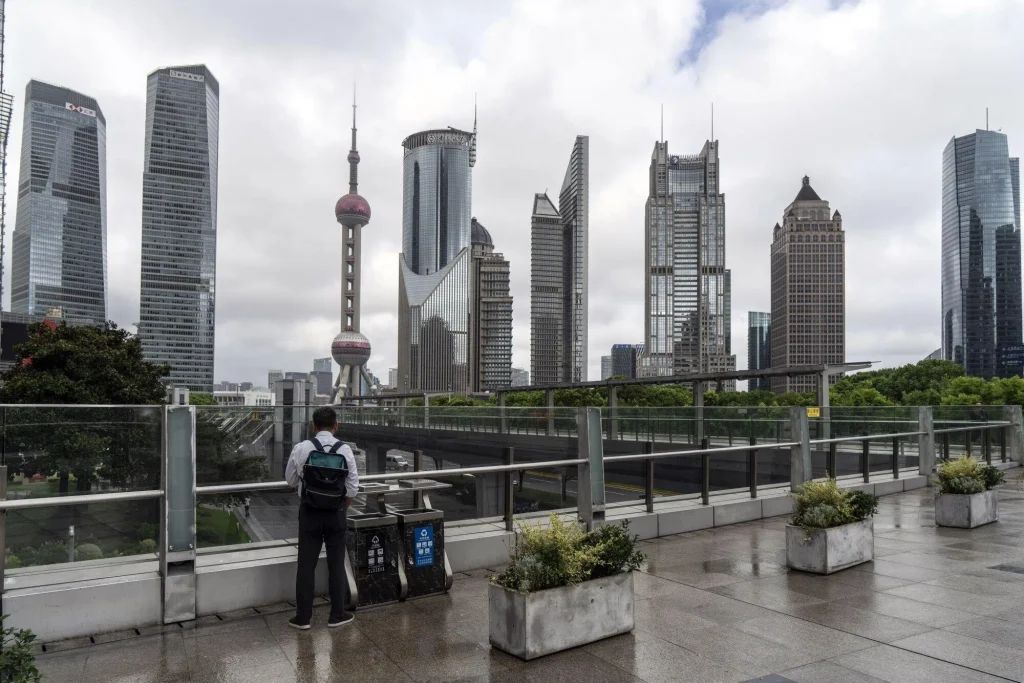ECONOMISTS expect deflationary pressure to get worse in China, even as they improve forecasts for growth and exports this year after a truce in the trade war with the US.
Consumer prices will likely increase by just 0.3 per cent in 2025 from a year ago, the lowest projection since Bloomberg began polling the question in 2023 and down from the 0.4 per cent predicted in April. China has seen economy-wide prices falling for two straight years, with consumer inflation below zero for the past three months.
The outlook for prices is deteriorating despite a more upbeat view of the world’s second-biggest economy after China and the US agreed to a temporary reduction of the punishing tariffs they have imposed against each other.
Gross domestic product is forecast to expand 4.5 per cent this year, based on a survey of 67 economists and analysts conducted over the past week, up from the median estimate of 4.2 per cent in the previous poll.
“Recent data such as industrial production and exports suggest a degree of economic resilience amid the tariff negotiations,” said Dennis Shen, an economist at Scope Ratings. “Nevertheless, deflationary forces remain a core macroeconomic challenge.”
The reprieve on tariffs will do little for a domestic economy beset by price wars and contending with a prolonged property slump that’s suppressed demand. Deflation is eating into corporate profits and worker incomes, which can lead to a negative loop and result in even lower prices.
BT in your inbox

Start and end each day with the latest news stories and analyses delivered straight to your inbox.
Even so, the 90-day pause on tariffs has sent trade between China and the US surging as companies race to front-load orders. That’s prompted economists to rewrite their forecasts for 2025 and predict exports will grow 1.1 per cent from a year ago, a sharp upgrade from the 1 per cent contraction expected in April.
Apart from trade, economists polled by Bloomberg also raised their estimates for China’s industrial output and retail sales growth this year.
But a more favourable backdrop for trade also means Chinese officials will probably deploy less support for the domestic economy than previously anticipated by markets, including fiscal and monetary stimulus.
The People’s Bank of China will likely lower its main policy rate – the cost of seven-day funds it provides to lenders – by only 10 basis points in the fourth quarter, according to the survey. The reserve requirement ratio (RRR) is forecast to fall by 50 basis points in the final three months of the year.
Beijing’s policy restraint would only intensify doubts about the government’s ability to boost domestic demand as China heads for the longest streak of price declines since the 1960s. At the height of tensions with the US earlier this month, the central bank delivered cuts to the policy rate and the RRR, which determines the amount of cash lenders must set aside in reserves.
Producer prices, which measure the cost of goods at factory gates before they reach consumers, are now expected to decline 2 per cent this year, worse than the 1.8 per cent previously estimated. Consumer prices have fallen by 0.1 per cent so far in 2025.
“Economy-wide price weakness is becoming entrenched,” said Erica Tay, an economist at Maybank Securities. “Weak price-setting abilities affect company profits, and therefore employment and consumer spending. For consumption to thrive, prices are an issue that needs policy attention.” BLOOMBERG


